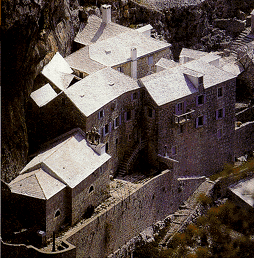![[ IMAGE: Brela - one ofthe most beautiful beaches on the Croatian Adriatic ]](brela2.gif)
![[ IMAGE: Brela - one ofthe most beautiful beaches on the Croatian Adriatic ]](brela2.gif)
As you travel south, the waters of the North and Central Adriatic combine and deepen to a colour so intense it enchants even the most discerning. This unique combination of natural beauty is matched by masterful architecture which totally sweeps away skyscrapers and traffic jams, at least for a while. In Trogir, which many call little Venice, this is more evident than elsewhere. A 4th century Greek relief was found there, depicting Kairos, the God of the Opportune Moment. Since he was always in flight, and had a forelock but no hair on the back of his head, he was hard to catch, just like fortune herself. But he settled in Trogir.
Arriving in Split and Dubrovnik, monument cities under UNESCO protection, which belong not only to the Croatian people but also to world heritage, it's like an emotional climax. Gone are the fragmented rocks of the middle Adriatic, here the islands are larger and more distanced. Due to the mild climate and a large number of sunny days per year many places, especially the island of Hvar, are suitable for winter holidays.
Just out to sea from Split, a city of exceptional grace and cultural and historical value, with its own harbour and airport, lies the island of Brac, the highest and third largest island in the Adriatic. There are plentiful pine forests, vineyards and olive groves. The white stone of Brac has been used in many famous buildings all over the world, from the palace of Diocletian in Split, to the White House in Washington. The Glagolitic stone "Pustinja" Blaca is the most peculiar architectural monument on Brac. Above Murvica there is the Cave of Dragonja, with valuable reliefs carved into stone.

The "Pustinja Blaca" Glagolithic stone is the most outstanding architectural monument on the Island of Brac |
Traditional seaside pleasures are to be found
in the numerous bays, on sandy and gravel beaches which form the long,
well-indented coast of Brac. The biggest attraction is Bol, the largest
tourist centre on the south of the island. The beaches have something special,
particularly Zlatni rat (the Golden Cape). Its gravel promontory shifts
from side to side as the wind and waves constantly change its shape.
When you return to everyday life, you will remember the olive groves and fishermen of Brac. You will remember elderly ladies peering at you through slightly opened windows as you promenaded below. And you will certainly remember how your world and theirs was bridged by an encounter made deeper with dry figs and home-made brandy. There are many seaside resorts on the island: Postire, Milna, Supetar. All have their sandy beaches, hotels and campsites.. All have their stone stairways where the local a capella singers croon long into the night. On these same stairs everlasting friendships are made, new loves begin and old ones are strengthened. |